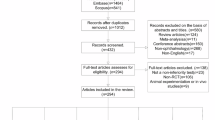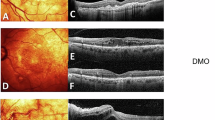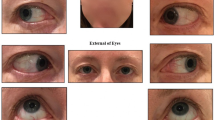Abstract
Purpose
To describe the strategy used for large-scale ophthalmological monitoring in the clinical development of the novel anticancer agent gefitinib (‘Iressa’, ZD1839), an epidermal growth factor receptor tyrosine kinase inhibitor, which had demonstrated ocular effects in preclinical animal models.
Methods
In this extensive clinical trial programme, patients in Phase I and II trials underwent frequent and intensive ophthalmological monitoring at baseline and during the trials. Data were reviewed by an external independent Ophthalmology Advisory Board.
Results
Ophthalmological data for 221 patients in Phase I trials of gefitinib and 425 patients in Phase II trials revealed no evidence of any consistent or drug-related ophthalmological toxicity. Interestingly, the baseline data revealed that, in an asymptomatic population, transient ophthalmological events are identified during monitoring.
Conclusions
This study reports the methodology and normative data in an ophthalmological screening programme that should prove useful for future studies.
Similar content being viewed by others
Log in or create a free account to read this content
Gain free access to this article, as well as selected content from this journal and more on nature.com
or
References
Yano S, Kondo K, Yamaguchi M, Richmond G, Hutchison M, Wakeling A et al. Distribution and function of EGFR in human tissue and the effect of EGFR tyrosine kinase inhibition. Anticancer Res 2003; 23: 3639–3650.
Breider MA . Irreversible inhibition of ErbB receptor family in rats results in epithelial atrophy and ulcerative dermatitis. Pharmacol Exp Ther 2000; 41: 493.
Hidalgo M, Siu LL, Nemunaitis J, Rizzo J, Hammond LA, Takimoto C et al. Phase I and pharmacologic study of OSI-774, an epidermal growth factor receptor tyrosine kinase inhibitor, in patients with advanced solid malignancies. J Clin Oncol 2001; 19: 3267–3279.
Liu Z, Carvajal M, Carraway CA, Carraway K, Pflugfelder SC . Expression of the receptor tyrosine kinases, epidermal growth factor receptor, ErbB2, and ErbB3, in human ocular surface epithelia. Cornea 2001; 20: 81–85.
Wilson SE, He YG, Weng J, Zieske JD, Jester JV, Schultz GS . Effect of epidermal growth factor, hepatocyte growth factor, and keratinocyte growth factor, on proliferation, motility and differentiation of human corneal epithelial cells. Exp Eye Res 1994; 59: 665–678.
Wilson SE, Liang Q, Kim WJ . Lacrimal gland HGF, KGF, and EGF mRNA levels increase after corneal epithelial wounding. Invest Ophthalmol Vis Sci 1999; 40: 2185–2190.
Carpenter G, Wahl MI . The epidermal growth factor family. Hand Exp Pharmacol 1990; 951: 69–171.
Schultz G, Cipolla L, Whitehouse A, Eiferman R, Woost P, Jumblatt M . Growth factors and corneal endothelial cells: III. Stimulation of adult human corneal endothelial cell mitosis in vitro by defined mitogenic agents. Cornea 1992; 11: 20–27.
Baselga J, Rischin D, Ranson M, Calvert H, Raymond E, Kieback DG et al. Phase I safety, pharmacokinetic, and pharmacodynamic trial of ZD1839, a selective oral epidermal growth factor receptor tyrosine kinase inhibitor, in patients with five selected solid tumor types. J Clin Oncol 2002; 20: 4292–4302.
Ranson M, Hammond LA, Ferry D, Kris M, Tullo A, Murray PI et al. ZD1839, a selective oral epidermal growth factor receptor-tyrosine kinase inhibitor, is well tolerated and active in patients with solid, malignant tumors: results of a phase I trial. J Clin Oncol 2002; 20: 2240–2250.
Herbst RS, Maddox AM, Rothenberg ML, Small EJ, Rubin EH, Baselga J et al. Selective oral epidermal growth factor receptor tyrosine kinase inhibitor ZD1839 is generally well-tolerated and has activity in non-small-cell lung cancer and other solid tumors: results of a phase I trial. J Clin Oncol 2002; 20: 3815–3825.
Fukuoka M, Yano S, Giaccone G, Tamura T, Nakagawa K, Douillard J-Y et al. Multi-institutional randomized phase II trial of gefitinib for previously treated patients with advanced non-small-cell lung cancer. J Clin Oncol 2003; 21: 2237–2246.
Kris MG, Natale RB, Herbst RS, Lynch Jr TJ, Prager D, Belani CP et al. Efficacy of gefitinib, an inhibitor of the epidermal growth factor receptor tyrosine kinase, in symptomatic patients with non-small cell lung cancer. A randomized trial. JAMA 2003; 290: 2149–2158.
National Cancer Institute Cancer Therapy Evaluation Program. Common toxicity criteria manual. Common toxicity criteria, version 2. http://ctep.info.nih.gov. April 1999.
International Conference on Harmonisation of Technical Requirements for Registration of Pharmaceuticals for Human Use. The International Conference on Harmonisation (ICH) Guidelines, E2A: Clinical Safety Data Management: Definitions and Standards for Expedited Reporting. http://www.ich.org. October 1994.
Liu Z, Carvajal M, Carothers Carraway CA, Carraway KL, Pflugfelder SC . Increased expression of the type 1 growth factor receptor family in the conjunctival epithelium of patients with keratoconjunctivitis sicca. Am J Ophthalmol 2000; 129: 472–480.
Pflugfelder SC, Jones D, Ji Z, Afonso A, Monroy D . Altered cytokine balance in the tear fluid and conjunctiva of patients with Sjogren's syndrome keratoconjunctivitis sicca. Curr Eye Res 1999; 19: 201–211.
al-Tweigeri T, Nabholtz JM, Mackey JR . Ocular toxicity and cancer chemotherapy. A review. Cancer 1996; 78: 1359–1373.
Author information
Authors and Affiliations
Corresponding author
Rights and permissions
About this article
Cite this article
Tullo, A., Esmaeli, B., Murray, P. et al. Ocular findings in patients with solid tumours treated with the epidermal growth factor receptor tyrosine kinase inhibitor gefitinib (‘Iressa’, ZD1839) in Phase I and II clinical trials. Eye 19, 729–738 (2005). https://doi.org/10.1038/sj.eye.6701630
Published:
Issue date:
DOI: https://doi.org/10.1038/sj.eye.6701630
Keywords
This article is cited by
-
RETRACTED ARTICLE: Tarsoconjunctival Granulation Tissue Formation Associated with EGFR Inhibitors
Oncology and Therapy (2023)
-
Ocular Toxicity of Targeted Anticancer Agents
Drugs (2021)
-
Markedly increased ocular side effect causing severe vision deterioration after chemotherapy using new or investigational epidermal or fibroblast growth factor receptor inhibitors
BMC Ophthalmology (2020)
-
Phase I trial of vandetanib in combination with gemcitabine and capecitabine in patients with advanced solid tumors with an expanded cohort in pancreatic and biliary cancers
Investigational New Drugs (2016)
-
EGFR inhibitor Gefitinib attenuates posterior capsule opacification in vitro and in the ex vivo human capsular bag model
Graefe's Archive for Clinical and Experimental Ophthalmology (2015)



